Fleurs du Mal Magazine


Or see the index
Le premier recueil de poésie d’Arthur Teboul, auteur et chanteur du groupe Feu! Chatterton.
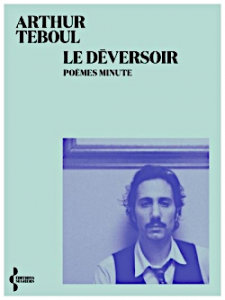 Comme chanteur, Arthur Teboul incarne un esprit rock et romantique, entre popanglo-saxonne (Radiohead) et chanson française (Ferré, Gainsbourg, Bashung), entre ambiance feutrée d’un jazz club et néons perçants d’une scène underground ; poétique et inspiré, il est de ces nouvelles voix talentueuses qui parlent à la jeunesse et, brouillant les frontières habituelles entre les genres, redéfinissent de manière originale et séduisante la scène musicale en France.
Comme chanteur, Arthur Teboul incarne un esprit rock et romantique, entre popanglo-saxonne (Radiohead) et chanson française (Ferré, Gainsbourg, Bashung), entre ambiance feutrée d’un jazz club et néons perçants d’une scène underground ; poétique et inspiré, il est de ces nouvelles voix talentueuses qui parlent à la jeunesse et, brouillant les frontières habituelles entre les genres, redéfinissent de manière originale et séduisante la scène musicale en France.
Auteur des paroles du groupe (des paroles au caractère quasiment visionnaire, qui marquent par leur capacité à saisir l’air du temps), Arthur Teboul confesse qu’il est venu à la musique par la littérature. Il plaide pour une existence où la poésie aurait une plus grande part. On devine facilement qu’il porte en lui la dimension d’un écrivain.
De fait, entre les phases d’écriture des chansons de ses albums, il a pris l’habitude de composer ce qu’il appelle des poèmes minute, lors de séances de ” déversement ” ou d’écriture automatique. Entre le poème en prose et le récit onirique, ce sont de courts textes dont les idées et les émotions seraient les protagonistes, riches en inventions, pleins de mystère, de vivacité, de drôlerie, d’étrangeté et de beauté. Ils composent ce recueil, Le Déversoir.
Arthur Teboul est le chanteur de Feu! Chatterton. Après le succès de l’album Palais d’Argile et de son single Un monde nouveau qui lui ont valu trois nominations aux Victoires de la musique en 2022 (meilleur artiste masculin, meilleur album, meilleure chanson), le groupe a sillonné la France. Une impressionnante tournée couronnée de trois disques d’or, quis’est conclue par trois Olympia à guichet fermé. Le Déversoir est son premier recueil de poésie.
Auteur: Arthur Teboul
Poésie
Le Déversoir – Poèmes minute
Editeur: Seghers
Paru le 16 mars 2023
EAN 9782232146626
ISBN 2232146626
Nombre de pages: 256
Format 14cm x 19cm
Broché
€ 18,00
• fleursdumal.nl magazine
More in: # Music Archive, #Editors Choice Archiv, - Book News, - Bookstores, Archive S-T, Archive S-T, Thomas Chatterton

Thomas Chatterton
(1752-1770)
Song from Ælla
SING unto my roundelay,
O drop the briny tear with me;
Dance no more at holyday,
Like a running river be:
My love is dead,
Gone to his death-bed
All under the willow-tree.
Black his cryne [1] as the winter night,
White his rode [2] as the summer snow,
Red his face as the morning light,
Cole he lies in the grave below:
My love is dead,
Gone to his death-bed
All under the willow-tree.
Sweet his tongue as the throstle’s note,
Quick in dance as thought can be,
Deft his tabor, cudgel stout;
O he lies by the willow-tree!
My love is dead,
Gone to his death-bed
All under the willow-tree.
Hark! the raven flaps his wing
In the brier’d dell below;
Hark! the death-owl loud doth sing
To the nightmares, as they go:
My love is dead,
Gone to his death-bed
All under the willow-tree.
See! the white moon shines on high;
Whiter is my true-love’s shroud:
Whiter than the morning sky,
Whiter than the evening cloud:
My love is dead,
Gone to his death-bed
All under the willow-tree.
Here upon my true-love’s grave
Shall the barren flowers be laid;
Not one holy saint to save
All the coldness of a maid:
My love is dead,
Gone to his death-bed
All under the willow-tree.
With my hands I’ll dent the briers
Round his holy corse to gre [3]:
Ouph [4] and fairy, light your fires,
Here my body still shall be:
My love is dead,
Gone to his death-bed
All under the willow-tree.
Come, with acorn-cup and thorn,
Drain my heartès blood away;
Life and all its good I scorn,
Dance by night, or feast by day:
My love is dead,
Gone to his death-bed
All under the willow-tree.
1 cryne – hair
2 rode – complexion
3 gre – grow
4 ouph – elf
Thomas Chatterton poetry
fleursdumal.nl magazine
More in: Archive C-D, Thomas Chatterton
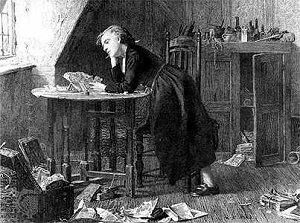
Thomas Chatterton
(1752-1770)
AN EXCELENTE BALADE OF CHARITIE
N Virgynë the sweltrie sun gan sheene,
And hotte upon the mees did caste his raie;
The apple rodded from its palie greene,
And the mole peare did bende the leafy spraie;
The peede chelandri sunge the livelong daie;
‘Twas nowe the pride, the manhode of the yeare,
And eke the grounde was dighte in its moste defte aumere.
The sun was glemeing in the midde of daie,
Deadde still the aire, and eke the welken blue,
When from the sea arist in drear arraie
A hepe of cloudes of sable sullen hue,
The which full fast unto the woodlande drewe,
Hiltring attenes the sunnis fetive face,
And the blacke tempeste swolne and gatherd up apace.
Beneathe an holme, faste by a pathwaie side,
Which dide unto Seyncte Godwine’s covent lede,
A hapless pilgrim moneynge did abide.
Pore in his newe, ungentle in his weede,
Longe bretful of the miseries of neede,
Where from the hail-stone coulde the almer flie?
He had no housen theere, ne anie covent nie.
Look in his glommed face, his sprighte there scanne;
Howe woe-be-gone, how withered, forwynd, deade!
Haste to thie church-glebe-house, asshrewed manne!
Haste to thie kiste, thie onlie dortoure bedde.
Cale, as the claie whiche will gre on thie hedde,
Is Charitie and Love aminge highe elves;
Knightis and Barons live for pleasure and themselves.
The gatherd storme is rype; the bigge drops falle;
The forswat meadowes smethe, and drenche the raine;
The comyng ghastness do the cattle pall,
And the full flockes are drivynge ore the plaine;
Dashde from the cloudes the waters flott againe;
The welkin opes; the yellow levynne flies;
And the hot fierie smothe in the wide lowings dies.
Liste! now the thunder’s rattling clymmynge sound
Cheves slowlie on, and then embollen clangs,
Shakes the hie spyre, and losst, dispended, drown’d,
Still on the gallard eare of terroure hanges;
The windes are up; the lofty elmen swanges;
Again the levynne and the thunder poures,
And the full cloudes are braste attenes in stonen showers.
Spurreynge his palfrie oere the watrie plaine,
The Abbote of Seyncte Godwynes convente came;
His chapournette was drented with the reine,
And his pencte gyrdle met with mickle shame;
He aynewarde tolde his bederoll at the same;
The storme encreasen, and he drew aside,
With the mist almes craver neere to the holme to bide.
His cope was all of Lyncolne clothe so fyne,
With a gold button fasten’d neere his chynne;
His autremete was edged with golden twynne,
And his shoone pyke a loverds mighte have binne;
Full well it shewn he thoughten coste no sinne:
The trammels of the palfrye pleasde his sighte,
For the horse-millanare his head with roses dighte.
“An almes, sir prieste!” the droppynge pilgrim saide,
“O! let me waite within your covente dore,
Till the sunne sheneth hie above our heade,
And the loude tempeste of the aire is oer;
Helpless and ould am I alas! and poor;
No house, ne friend, ne moneie in my pouche;
All yatte I call my owne is this my silver crouche.”
“Varlet,” replyd the Abbatte, “cease your dinne;
This is no season almes and prayers to give;
Mie porter never lets a faitour in;
None touch mie rynge who not in honour live.”
And now the sonne with the blacke cloudes did stryve,
And shettynge on the grounde his glairie raie,
The Abbatte spurrde his steede, and eftsoones roadde awaie.
Once moe the skie was blacke, the thunder rolde;
Faste reyneynge oer the plaine a prieste was seen;
Ne dighte full proude, ne buttoned up in golde;
His cope and jape were graie, and eke were clene;
A Limitoure he was of order seene;
And from the pathwaie side then turned hee,
Where the pore almer laie binethe the holmen tree.
“An almes, sir priest!” the droppynge pilgrim sayde,
“For sweete Seyncte Marie and your order sake.”
The Limitoure then loosen’d his pouche threade,
And did thereoute a groate of silver take;
The mister pilgrim dyd for halline shake.
“Here take this silver, it maie eathe thie care;
We are Goddes stewards all, nete of oure owne we bare.
“But ah! unhailie pilgrim, lerne of me,
Scathe anie give a rentrolle to their Lorde.
Here take my semecope, thou arte bare I see;
Tis thyne; the Seynctes will give me mie rewarde.”
He left the pilgrim, and his waie aborde.
Virgynne and hallie Seyncte, who sitte yn gloure,
Or give the mittee will, or give the gode man power.
Thomas Chatterton poetry
fleursdumal.nl magazine
More in: Archive C-D, Thomas Chatterton
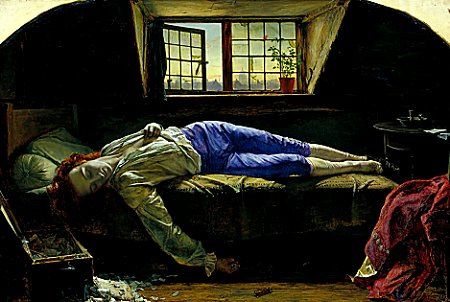
Thomas Chatterton
(1752-1770)
Song from Ælla
SING unto my roundelay,
O drop the briny tear with me;
Dance no more at holyday,
Like a running river be:
My love is dead,
Gone to his death-bed
All under the willow-tree.
Black his cryne [1] as the winter night,
White his rode [2] as the summer snow,
Red his face as the morning light,
Cole he lies in the grave below:
My love is dead,
Gone to his death-bed
All under the willow-tree.
Sweet his tongue as the throstle’s note,
Quick in dance as thought can be,
Deft his tabor, cudgel stout;
O he lies by the willow-tree!
My love is dead,
Gone to his death-bed
All under the willow-tree.
Hark! the raven flaps his wing
In the brier’d dell below;
Hark! the death-owl loud doth sing
To the nightmares, as they go:
My love is dead,
Gone to his death-bed
All under the willow-tree.
See! the white moon shines on high;
Whiter is my true-love’s shroud:
Whiter than the morning sky,
Whiter than the evening cloud:
My love is dead,
Gone to his death-bed
All under the willow-tree.
Here upon my true-love’s grave
Shall the barren flowers be laid;
Not one holy saint to save
All the coldness of a maid:
My love is dead,
Gone to his death-bed
All under the willow-tree.
With my hands I’ll dent the briers
Round his holy corse to gre [3]:
Ouph [4] and fairy, light your fires,
Here my body still shall be:
My love is dead,
Gone to his death-bed
All under the willow-tree.
Come, with acorn-cup and thorn,
Drain my heartès blood away;
Life and all its good I scorn,
Dance by night, or feast by day:
My love is dead,
Gone to his death-bed
All under the willow-tree.
1 cryne – hair – 2 rode – complexion – 3 gre – grow – 4 ouph – elf
Thomas Chatterton poetry
fleursdumal.nl magazine
More in: Archive C-D, Chatterton, Thomas, Thomas Chatterton

George Sand
(1804-1876)
Chatterton
Quand vous aurez prouvé, messieurs du journalisme,
Que Chatterton eut tort de mourir ignoré,
Qu’au Théâtre-Français on l’a défiguré,
Quand vous aurez crié sept fois à l’athéisme,
Sept fois au contresens et sept fois au sophisme,
Vous n’aurez pas prouvé que je n’ai pas pleuré.
Et si mes pleurs ont tort devant le pédantisme,
Savez-vous, moucherons, ce que je vous dirai ?
Je vous dirai : ” Sachez que les larmes humaines
Ressemblent en grandeur aux flots de l’Océan ;
On n’en fait rien de bon en les analysant ;
Quand vous en puiseriez deux tonnes toutes pleines,
En les faisant sécher, vous n’en aurez demain
Qu’un méchant grain de sel dans le creux de la main. ”
George Sand poetry
fleursdumal.nl magazine
More in: Archive S-T, Chatterton, Thomas, George Sand, Thomas Chatterton
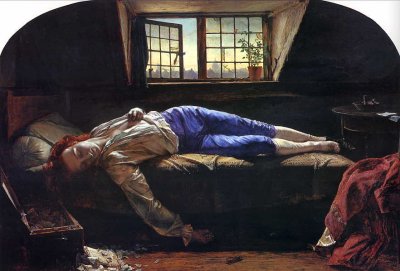
Thomas Chatterton
(1752-1770)
A New Song
Ah blame me not, Catcott, if from the right way
My notions and actions run far.
How can my ideas do other but stray,
Deprived of their ruling North-Star?
A blame me not, Broderip, if mounted aloft,
I chatter and spoil the dull air;
How can I imagine thy foppery soft,
When discord’s the voice of my fair?
If Turner remitted my bluster and rhymes,
If Hardind was girlish and cold,
If never an ogle was got from Miss Grimes,
If Flavia was blasted and old;
I chose without liking, and left without pain,
Nor welcomed the frown with a sigh;
I scorned, like a monkey, to dangle my chain,
And paint them new charms with a lie.
Once Cotton was handsome; I flam’d and I burn’d,
I died to obtain the bright queen;
But when I beheld my epistle return’d,
By Jesu it alter’d the scene.
She’s damnable ugly, my Vanity cried,
You lie, says my Conscience, you lie;
Resolving to follow the dictates of Pride,
I’d view her a hag to my eye.
But should she regain her bright lustre again,
And shine in her natural charms,
‘Tis but to accept of the works of my pen,
And permit me to use my own arms.
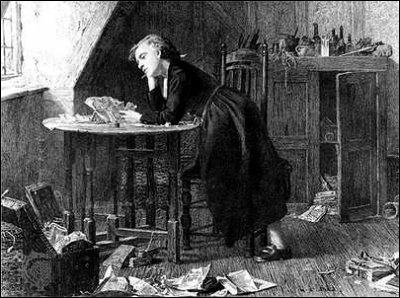
fleursdumal.nl magazine
More in: Archive C-D, Chatterton, Thomas, Thomas Chatterton
Thank you for reading Fleurs du Mal - magazine for art & literature